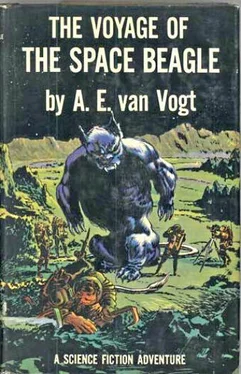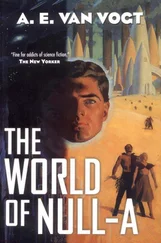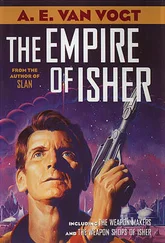He broke off. His lips pursed. His eyes narrowed with calculation. He said, “Captain Leeth has twice tried to make a deal with me. Now we’ll pretend to agree, and you go over with your machine. We’ll attack the moment you signal us.” He explained with dignity. “You understand, I would not consider dealing with either Kent or Captain Leeth except as a means to victory. You appreciate that, I hope?”
Grosvenor found Captain Leeth in the control room. The commander greeted him with stiff-backed friendliness. “This fight among the scientists,” he said earnestly, “has placed the military in an awkward position. We’ve got to defend the control room and the engine room and so perform our minimum duty to the expedition as a whole.” He shook his head gravely. “It’s out of the question, of course, that either of them be allowed to win. In the final issue, we of the military are prepared to sacrifice ourselves to prevent the victory of either group.”
The explanation startled Grosvenor out of his own purpose. He had been wondering if Captain Leeth was responsible for aiming the ship directly at a sun. Here was at least partial confirmation. The commander’s motivation seemed to be that victory for any group but the military was unthinkable. With that beginning, it was probably only a tiny step to the concept that the whole expedition must be sacrificed.
Casually, Grosvenor pointed the directional sender of the adjuster at Captain Leeth.
Brain waves, minute pulsations transmitted from axon to dendrite, from dendrite to axon, always following a previously established path depending on past associations — it was a process that operated endlessly among the ninety million neuron cells of a human brain. Each cell was in its own state of electro-colloidal balance, an intricate interplay of tension and impulse. Only gradually, over the years, had machines been developed that could detect with some degree of accuracy the meaning of the energy flow inside the brain.
The earliest encephalo-adjuster was an indirect descendant of the famous electroencephalograph. But its function was the reverse of that first device. It manufactured artificial brain waves of any desired pattern. Using it, a skilful operator could stimulate any part of the brain, and so cause thoughts, emotions, and dreams, and bring up memories from the individual’s past. It was not in itself a controlling instrument. The subject maintained his own ego. However, it could transmit the mind impulses of one person to a second person. Since the impulses varied according to the sender’s thoughts, the recipient was stimulated in a highly flexible fashion.
Unaware of the presence of the adjuster, Captain Leeth did not realize that his thoughts were no longer quite his own. He said, “The attack being made on the ship by the images makes the quarrel of the scientists traitorous and unforgivable.” He paused, then said thoughtfully, “Here’s my plan.”
The plan involved heat projectors, muscle-straining acceleration, and partial extermination of both groups of scientists. Captain Leeth failed even to mention the aliens, nor did it seem to occur to him that he was describing his intentions to an emissary of what he regarded as the enemy. He finished by saying, “Where your services will be important, Mr. Grosvenor, is in the science department. As a Nexialist, with a co-ordinative knowledge of many sciences, you can play a decisive role against the other scientists….”
Weary and disheartened, Grosvenor gave up. The chaos was too great for one man to overcome. Everywhere he looked were armed men. Altogether he had seen a score or more dead bodies. At any moment the uneasy truce between Captain Leeth and Director Morton would end in a burst of projector fire. Even now he could hear the roaring of the fans where Morton was holding off Kent’s attack.
He sighed as he turned back to the captain. “I’ll need some equipment from my own department,” he said. “Can you pass me through to the rear elevators? I can be back here in five minutes.”
As he guided his machine into the back door of his department a few minutes later, it seemed to Grosvenor that there was no longer any doubt about what he must do. What had seemed a far-fetched idea when he first thought of it was now the only plan he had left.
He must attack the aliens through their myriad images, and with their own hypnotic weapons.
Grosvenor was aware of Korita watching him as he made his preparations. The archaeologist came over and looked at the array of electrical instruments he was attaching to the encephalo-adjuster, but he asked no questions. He seemed to be fully recovered from his experience.
Grosvenor kept wiping the perspiration from his face. And yet it was not warm. The room temperature stood at normal. By the time his preliminary work was done, he realized that he had to stop to analyse his anxiety. He just didn’t, he decided finally, know enough about the enemy.
It was not sufficient that he had a theory about how they were operating. The great mystery was an enemy who had curiously womanlike bodies and faces, some partly doubled, some single. He needed a reasonable philosophic basis for action. He needed that balance for his plan which only knowledge could give him.
He turned to Korita, and asked, “In terms of cyclic history, what stage of culture could these beings be in?”
The archaeologist sat down in a chair, pursed his lips, and said, “Tell me your plan.”
The Japanese grew pale as Grosvenor described it. He said finally, almost irrelevantly, “How is it you were able to save me, and not the others?”
“I got to you right away. The human nervous system learns by repetition. For you, their light pattern hadn’t repeated as often as for the others.”
“Is there any way we could have avoided this disaster?” he asked grimly.
Grosvenor smiled a wan smile. “Nexial training could have done it, since that includes hypnotic conditioning. There’s only one sure protection against hypnosis, and that is to be trained in it in exactly the right way.”
He broke off. “Mr. Korita, please answer my question. Cyclic history?”
A thin, wet line of moisture formed on the archaeologist’s brow. “My friend,” he said, “surely you can’t expect a generalization at this stage. What do we know about these beings?”
Grosvenor groaned inwardly. He recognized the need for discussion, but vital time was passing. He said indecisively. “Beings who can use hypnosis over a distance, as these can would probably be able to stimulate each other’s minds, and so would have naturally the kind of telepathy that human beings can obtain only through the encephalo-adjuster.”
He leaned forward, abruptly excited. “Korita, what effect would the ability to read minds without artificial aids have on a culture?”
The archaeologist was sitting up. “Why of course,” he said. “You have the answer. Mind reading would stultify the development of any race, and therefore this one is in the fellahin stage.”
His eyes were bright as he stared at the puzzled Grosvenor. “Don’t you see? The ability to read another’s mind would make you feel that you know about him. On that basis, a system of absolute certainties would develop. How could you doubt when you know? Such beings would flash through the early periods of their culture, and arrive at the fellah period in the swiftest possible time.”
Alertly, while Grosvenor sat frowning, he described how various civilizations of Earth and galactic history had exhausted themselves, and then stagnated into fellahdom. Fellah people resented newness and change. They were not particularly cruel as a group, but because of their poverty they all too frequently develop an indifference toward the suffering of individuals.
Читать дальше











